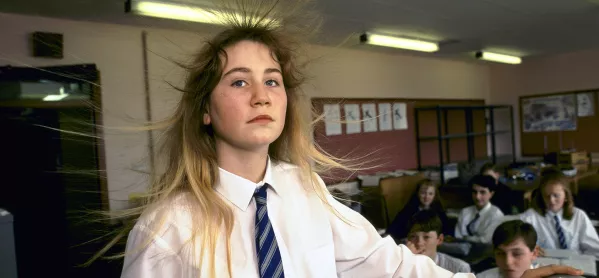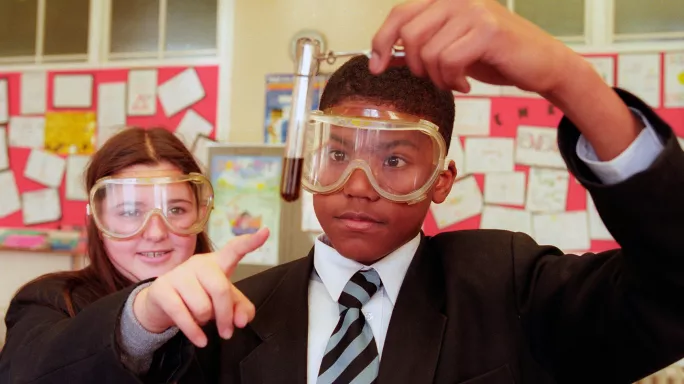- Home
- 5 tips for better GCSE science practicals
5 tips for better GCSE science practicals

“Are we doing a practical today?” will be a familiar greeting for many science teachers.
Pupils generally enjoy doing practical investigations (although often this is more about having an opportunity to work with their mates than an overwhelming desire to be the next Rutherford). But for both teachers and pupils, they can be massively challenging.
Managing the classroom is difficult enough: 32 pupils, not enough equipment, faulty equipment, lack of space, health and safety, keeping pupils on task - even in a profession in which keeping multiple plates spinning is part of the job, running a practical with a large class can be overwhelming.
That’s not to mention the fact that, with the current GCSE specification, pupils also have to remember how they did the practicals, and apply their knowledge and understanding to novel contexts.
In my experience, schools often overlook this part of the GCSE course and focus more on the subject content. Feedback from the AQA trilogy exams last year also suggests that familiarity with the required practicals and techniques used is an area for development.
Quick read: How to help your students prepare for GCSE science
Quick listen: What every teacher needs to know about memory
Want to know more? GCSE exams 2019: 5 pitfalls to avoid
Part of the problem is that practical work can place a massive burden on pupils’ working memory. They have equipment to deal with, results to record, safety to consider, peers moving around providing distractions, plus often lengthy and complex procedures to follow.
Even if they manage to get the practical done correctly, there’s a high chance that - due to the burden on working memory - they won’t remember how they’ve done it.
How can we make it more manageable for them? Here are some suggestions.
1. Theory first
Wouldn’t it be fantastic if pupils could design an investigation into the I-V characteristics of a resistor and independently discover Ohm’s law?
Sadly, pupils correctly recreating the discoveries of great scientists on their own is a rare event. To make things worse, a dodgy set of results can create or reinforce misconceptions.
So don’t run the risk; teach them the theory first. Use the practical (maybe at the end of the topic) to reinforce the key concepts. That way, if the results don’t back up the theory, you can at least discuss why.
This provides a great opportunity to talk about accuracy, repeatability/reproducibility, sources of error, possible improvements and so on.
2. Use visuals
Many written methods for practical investigations (including those provided by the exam boards) can be complex and difficult for pupils to follow. This unnecessary load on pupils’ working memory can be reduced somewhat with visual instructions.
Adam Boxer (@adamboxer), inspired by the work of Bob Worley and David Paterson, has produced visual instructions for some of the GCSE chemistry required practicals, and has links to some for other subjects on his blog.
But making your own visual instructions is not as time-consuming as you’d think, and allows you to tailor the instructions for your school’s particular equipment or method.

3. Take it slow
I used to tease a very experienced colleague about the way he carried out practical investigations with a class. He would get all the pupils to follow his instructions while he demonstrated from the front, step by step. He argued that any other method could result in carnage.
Although I used to mock him for his controlling nature, I now appreciate exactly where he was coming from - as well as reducing the chance of laboratory chaos, slowing down the practical and forcing pupils to take it step by step while you model from the front will reduce the burden on working memory, increasing the likelihood that pupils will remember how to do it.
Conducting practicals in this way has another benefit: it gives you a chance to narrate what you’re doing and why: how you’re measuring accurately, why you need to do it this way, why you’re repeating a measurement and so on. These opportunities are often missed if pupils throw themselves into the practical unguided.
This doesn’t mean you can’t be less controlling later on, once pupils have mastered the basics, but initially it makes sense to keep it simple.
Boxer calls this the “slow practical” and has written about how he does it here.
4. Develop scientific language
Help pupils to develop fluency with the language of science - not just the subject-specific vocabulary (“accuracy”, “resolution” and so on), but also scientific equipment. Make sure they can use “petri dish” rather than “plastic container” and “spatula” rather than “spoon”. While you’re at it, practise the correct spellings and get them to draw diagrams of these pieces of apparatus.
Build this into key stage 3 teaching. Use the correct language repeatedly, quiz them on it, give them spelling tests. If they are familiar and confident with the correct language, it will free up their minds to focus on the more complex stuff when the time comes, such as reading the exam question carefully and constructing an answer.
5. Tap into subject expertise
Make time for the science department to share their expertise with each other. Time spent with an experienced subject specialist trying out the practicals before you attempt to teach it is really beneficial.
Key things to ask: what are the most common mistakes pupils are likely to make? Which misconceptions do you need to pre-empt? Which questions might an exam paper ask about this practical? How can the techniques from this practical be used in a different context?
Trying out and discussing these elements of the practical with a colleague beforehand will improve your confidence and understanding, which will make it easier for you to do the same for your pupils.
Bob Pritchard is lead practitioner (physics) at St John Plessington Catholic College
Further reading
Keep reading for just £1 per month
You've reached your limit of free articles this month. Subscribe for £1 per month for three months and get:
- Unlimited access to all Tes magazine content
- Exclusive subscriber-only stories
- Award-winning email newsletters
